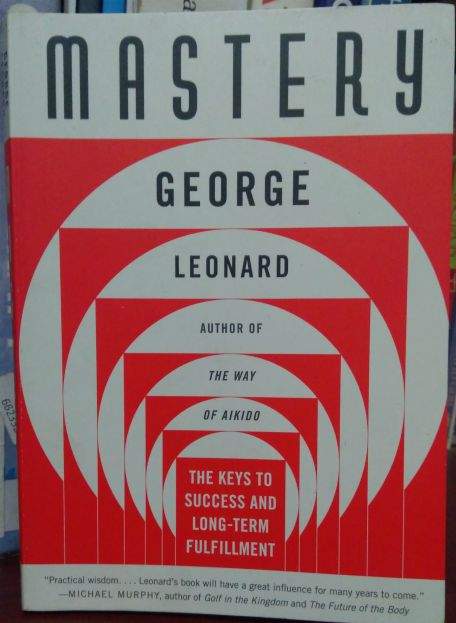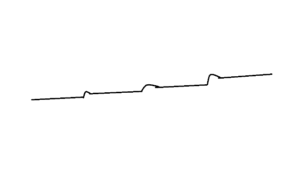
Gorge Leonard (1923-2010) presents a big idea in his small book called Mastery. This book shows that if you are willing to walk the long road of mastery then you can achieve lasting success.
George Leonard emphasizes on the fact that quick-fix solutions and instant gratifications will not get you far. You should be willing to go through the grind.
Mastery is a path where you will achieve your goals, reach new heights and go on to set even bigger goals. This path has no end. It’s a continuous process of achieving greatness, not goals and targets.
This philosophy can be applied to every field you are striving to improve, be it business, relationship, or sports.
In your fitness journey, this book is an essential tool to keep you on the right track when the results are slow and you seem to be making no progress despite your best efforts.
In an era of 12-minutes fat loss exercises and 12-weeks transformation programs, mastery teaches you how you can achieve lifelong fitness. If you are not able to stick to your diet and are not consistent with your exercise regimes, then this is a must-read for you.
Table of Contents
What is Mastery
The term mastery itself is very elusive and vague, yet it is easily recognizable. You cannot pinpoint what makes someone a master in his/her given field but you can easily identify a master when you see one. Achieving mastery is not a one-time thing or a goal that you can reach. It is a continuous process. A journey where the journey itself is the destination.
The path of mastery is not for the goal-oriented people as it involves periods of long plateaus.
Plateaus are periods when you will see no progress or any significant improvement happening. If you are putting in the work expecting some results in a specific duration, then you will be disappointed. Most of the time it will be like practice-practice, with little results to be seen.
After a while, something will click and you will make enormous progress in a short span. But will again be meeting with another plateau after seeing that progress. This time, though, the level of the plateau will be higher than the previous plateau.
Goal exists in the future. Practice, the path of mastery, exists only in the present. You can see it, hear it, smell it, feel it. To love the plateau is to love the eternal now, to enjoy the inevitable spurts of progress and the fruits of accomplishment, then serenely to accept the new plateau that waits just beyond them. To love the plateau is to love what is essential and enduring in your life.
Mastery Curve
In the master’s journey, plateaus are the learning ground where you have to be willing to spend most of your time. You have to practice diligently, striving to hone your skills to attain new levels of competence. The plateau is where all these efforts will add up over time and then it will culminate in a compound effect and you will see huge progress in short duration.
Here is a good video explanation about the Mastery Curve:
The good news about Mastery is that it –
Isn’t reserved for super talented or even for those who are fortunate enough to have gotten an early start. It’s available to anyone willing to get on the path and stay on it – regardless of age, sex, or previous experience.
The Dabbler, The Obsessive, The Hacker
The path to mastery is what we all strive for but this path is long and sometimes treacherous with no promise of immediate rewards or success. George Leonard describes three types of personality traits that get started on this path but are not able to go far and usually drop out.
See if you can identify with any of these 3 personality traits
The Dabbler
Dabblers are the ones who enjoy the initial phase of anything. They get over-excited with small initial success, showing it off to everyone they meet.
So, in the gym, when they see the results they get in the beginning like getting good at lifting weights and adding weights with every workout session.
Seeing the changes in their physique or watching their body weight coming down, they get over-excited. But when it stops coming with the same regularity they start losing interest.
The Obsessive
These are the people who cannot settle for second place. Right from the start, they want to master the skill. And if they fail to meet this, they will double up their efforts and be going at it relentlessly.
They manage to keep making progress for a while but when the inevitable decline comes, they are likely to get hurt and not able to handle the reality.
So after the initial progress when things start to slow down as it naturally does, they will ramp up the efforts. They would again see some results. But as time passes, despite all the efforts, when they stop seeing the kind of results they expected they probably will not be able to handle it and would drop the whole thing.
In the gym, these are the people spending hours doing all sorts of exercises.
The Hacker
The hacker is a person who is willing to stay on the plateau indefinitely. He doesn’t see it as a learning curve but as a place of comfort.
He has developed some level of skills and is happy with it.
These are the people who go to the gym just for the sake of maintaining whatever they have achieved. They don’t strive to improve or learn anything new.
Starting on the path of mastery is easy; the real challenge lies in staying on the path.
The best way to achieve your goals is through modest expectations and regular efforts.
If you are climbing a mountain, be aware of the peak where you want to reach. But your whole focus should be on the path and you will reach the top. When you reach a set goal it is not just about achieving the goal but the process helps you to grow as a person as well.
Path of mastery is laid out with long roads of plateaus; it keeps you stable on an otherwise restless, distracted and ultimately self-destructive state.
You can only enjoy the plateau if you are in love with what you are doing. If you are doing it for fame, money or any other type of rewards you are most likely be not going very far.
My favourite Mastery Quotes by George Leonard
But it seems to me that mastery’s true face is relaxed and serene, sometimes faintly smiling. Those we most admire in sports seem at times to enter another dimension. Besieged by opposing players, battered by the screams of the crowd, they make the difficult, even the supernatural, seem easy, and manage somehow to create harmony where chaos might otherwise prevail.
There’s another secret:
The people we know as masters don’t devote themselves to their particular skill just to get better at it. The truth is, they love to practice – and because of this they do get better.
The courage of a master is measured by his or her willingness to surrender. This means surrendering to your teacher and the demands of your discipline. It also means surrendering your hard-won proficiency from time to time to reach a higher or different level of proficiency.
Conclusion
In the book summary of Mastery, I have focused on how the concept of mastery applies in fitness. Most people don’t reach their fitness goals because they don’t have enough patience.
This book shows that with persistent practice, you can achieve any goal in life. I strongly recommend this book to anyone who is serious about their fitness goals.
Articles you may like
Learn How To Do Shoulder Shrugs Properly For Killer Traps
How To Do A Turkish Get Up (Kettlebell): Step-by-step Guide With Video Demonstration
7 Amazing Benefits Of Vitamin D That Will Boost Your Immunity

Leave a Reply